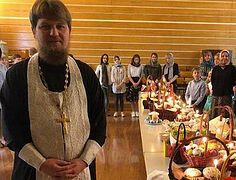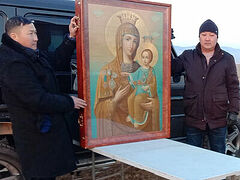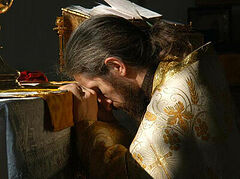He began in the church choir, he unexpectedly became a priest, and then quite suddenly ended up in Mongolia. May in Ulaanbaatar met Fr. Anthony with a terrible frost, but he came to love the new place of his ministry with all his heart. We spoke with Fr. Anthony, the rector of Holy Trinity Church in Ulaanbaatar about Mongolian tranquility and the wonders of conversion, the gym as a missionary tool, friendship with lamas, tips on combating internet addiction, and the beauty of the Gobi Desert.
 —What religion do the Mongols traditionally profess?
—What religion do the Mongols traditionally profess?
—Tibetan Lamaism, shamanism, and recently a large number of sects have appeared, including pseudo-Christian ones.
—Is it possible (and is it necessary) to interact with representatives of non-Orthodox confessions and other religions?
—It’s possible and necessary to interact. We’re in constant dialogue, and we always tell them who we are. For some reason, many Mongols perceive us as a semi-secular organization or non-profit fund. The Mongols in power, from the district administration for example, ask, “What are you doing here in Ulaanbaatar?” And when we say that we pray, they’re not satisfied with this answer, because they’re used to all sorts of sects in Mongolia who are involved not only in prayer, but also in other matters.
We have good relations with the traditional Buddhist sangha. They invite us to their events and conferences every year. The local lama and I always shake hands when we meet and ask each other how we’re doing. And they understand who we are; they’re not afraid. They even say things like: “May Orthodoxy spread further here and put a stranglehold on all the pseudo-Christian sects.”
We also have a relationship with the Catholic church in Mongolia, which is fairly widely represented in the country. I meet with Bishop Giorgio at some events; we have a dialogue and warm relations.
Interreligious cooperation is also quite developed. Protestants are always coming to us. Just a few days ago, two pastors came with these thoughts: “We thought about it and realized that we don’t have Apostolic Succession, but we really want to have a connection with the ancient Assyrian church. Can you help us?” I said: “Alright, but why the Assyrian church, when you have the Russian Orthodox Church right here?” They promised to think about it. Perhaps this is the first step towards their conversion.
There’s a sect of Mormons. They have their church in every aimag (district center) in Mongolia. The state started gradually squeezing them out, not extending a license to some parishes. Unexpectedly, the Mormons started being friendly with us, coming to our services, inviting us to their office, trying to hide behind us to some degree. There are things like this too.
—And how are relations with the state?
—Sometimes they support us, sometimes they simply don’t interfere. We have an annual problem—extending the community’s registration. Every year we have to get a license to carry out religious activities. The process is quite complex and lengthy. You have to go through various levels of authority, but somewhere they speed up this process for us. When we talk about mistakes, when we ask for help, the administration always makes concessions, and they issue the documents for us faster than is required by law.
—Please share the particularities of parish life with us. In what language do you celebrate the services ? Are there any peculiarities in the services? Perhaps there are some local traditions or especially revered feast days?
—The services are mainly celebrated in Church Slavonic, though part of the Liturgy is in Mongolian. The choir consists of three Mongols and one Russian lady. And these Mongolian women sing the antiphons in Mongolian. Until recently (when our American left), we read the Sacred Scripture in three languages: Church Slavonic, Mongolian, and English. I read the Epistle and Gospel in Church Slavonic, and our altar server in Mongolian (he speaks the language perfectly).
The most vivid tradition is the Christmas fireworks. On the evening of January 7, we always serve Great Vespers, during which we give out gifts. Our Orthodox children come, but local children always come from the “yurt districts,” and they also get gifts. Then we all set off fireworks together. The joy that we feel after the service, after the gifts to the children and the fireworks, is priceless.
—How involved are the parishioners in the life of the community?
—There’s no parish council like we’re used to in Russia. Nevertheless, the parishioners are very active. They plant flowers, clean, paint… They always participate. They clean the church themselves—there’s no one particularly responsible for it. And they don’t hesitate to tell me if they don’t like something. But this is a positive trait—it stimulates the priest to action and to work on himself. The community is quite active, helping the parish as much as possible in taking care of the facilities and other issues. Finally, we’ve launched a Sunday School, and our parishioners teach in it.
 —Have you managed to do any educational, charitable, or social projects?
—Have you managed to do any educational, charitable, or social projects?
—First of all, we allocate our annual humanitarian collection for the poor. We reach out to Russian organizations, we appeal to the Russian embassy in Mongolia, we raise funds and buy groceries. We do this twice a year, before Nativity and Pascha, and then we deliver it to people in need. I would say this is the most important thing we do in terms of charity. All our parishioners participate, and even Russian citizens who confess other religions.
We recently collected humanitarian goods for the residents of Donbass and the regions that became part of Russia. The cargo has already been delivered, and a good number of Mongols took part in this.
There’s a sports club at the parish, with judo, sambo, and Mongolian wrestling. The sports center was planned as a missionary project, but it didn’t turn out that way. The Mongols come, they train, and they leave. Few of them come to church, although I also do wrestling and workout in the gym with them. They know I’m a “Russian lama,” and that’s it. Nevertheless, the sports center is our social project. Besides the fact that we get some money from the sports center for parish upkeep, there’s a chance for our local Russian community, citizens of Russia and their children, to come and workout for free.
The church has also had an art school, Anima, for many years now. Children with various diseases and disabilities, with cerebral palsy, autism, attend the school. As I’m sure you understand, it’s very difficult to teach such children, but we’ve had some real artists come from there who paint some pretty serious and profound pieces. Some paint with their feet or their mouths because their arms don’t work. The Sunday School I mentioned is an ordinary Sunday School, with children from six to ten years old.
—Do you have another job? Do you think a priest should work?
—Work is an additional income for a priest, because not every parish can support him. I got a job at a local school when the music teacher couldn’t come because of the pandemic. I studied music, and they asked me to replace him. And I’ve been replacing him for three years already. There was no problem during the pandemic, because the parish was closed and there were hardly ever services. But now it’s pretty hard to combine them. I feel squeezed like a lemon after working at the school. This has slightly slowed down not only our parish activity (services and preaching), but also the administrative work.
If we’re talking in principle about the need for a priest to work, we have to look at the situation. Everyone should have hobbies, including priests. I used to be a little upset that the teachers didn’t come to church, but when I myself started working, I understood them quite well, because they simply don’t have the energy. Secular work helps you understand the people around you better—this is a definite plus for a pastor.
 —What serious spiritual questions do you get from your parishioners in your ministry?
—What serious spiritual questions do you get from your parishioners in your ministry?
—As everywhere, in any parish, people have a variety of problems. Lack of faith, for example. A man comes and says, “Father, I’m losing faith in God.” Sometimes you don’t know what to say. What do you say? It’s difficult. It’s a serious question. Some have family drama and discord, some have problems with their children. The pastoral practice of an Orthodox priest in Mongolia isn’t much different from what it is in Russia, quite frankly.
—What do you consider a challenge of the times for an Orthodox person?
—Information addiction. There’s too much information; it’s become easily accessible and takes up all our time, our spiritual and mental strength; it doesn’t allow a man to be alone with himself and think. That’s probably the biggest problem. We have to use our smartphones less, not watch TV at all, and observe an information fast 365 days a year.
—Can you give some practical advice, especially for people whose job is connected with working online and with large amounts of information?
—At one time, as a music school student, I tried to quit smoking, but it didn’t work out. I suffered from it: I’d quit for a week and then start again, and so on and so forth. I pleaded: “Lord, You see that I can do nothing myself. Help me be delivered from this infection!” And God helped. Therefore, first of all, ask God for help if you feel yourself becoming addicted to your phone and the endless consumption of information. You can ask in your own words, completely sincerely: “Lord, I’m trying to escape it, but nothing’s working. Help!”
The practical advice is probably pretty standard: You need time without your phone. You don’t have to pick up your phone in the morning. If it’s possible to set an alarm on something other than your phone, then do it. Let your mechanical alarm clock ring. When we go to work, we need to keep the distraction far away from us. But still, most of the information we consume today is through our smartphone. But it would be good to mark out days to discharge and not take our phones with us at all. For example, at least go to the store without your smartphone.
—What’s the main lesson of your priestly ministry?
—Don’t condemn people, no matter who comes to you as a priest. Don’t rush to draw conclusions about someone by some individual situations. And you have to see the image of God in everyone and believe that the Lord wants to save everyone. This is perhaps the main thing that guides me in my ministry.
—What places do you suggest that travelers to Mongolia visit?
—I’m completely delighted by the Gobi Desert. I never thought a desert could make such an impression and draw me so strongly. I’m madly in love with this place. I’ve been there several time and I’m always ready to go again and again.
The second place (rather inaccessible) is Lake Khövsgöl. The lake is crystal clear, 3,000 feet above Lake Baikal, with an absolutely incredible atmosphere. If you come to Mongolia, you have to get a car and travel around the country. There are many interesting things, especially in some wilderness places. The nature is incredible and the people are amazing. It’s cool to see the nomadic way of life, how the people live. Remember that when you see a yurt in the desert or steppe, you can always go to it and they’ll receive you and feed you and talk to you. The Mongols are very open and kind people.
—In conclusion, I’ll ask our traditional question. Which passage from the Holy Scriptures especially inspire and support you in difficult moments in your life?
—Put not your trust in princes, in sons of men, in whom there is no salvation (Ps. 145:2). This verse supports and comforts me. I also really like the Parable of the Good Samaritan. It’s a guide on how to treat people who can do evil to you. We mustn’t pass by even those who we consider our enemies.





